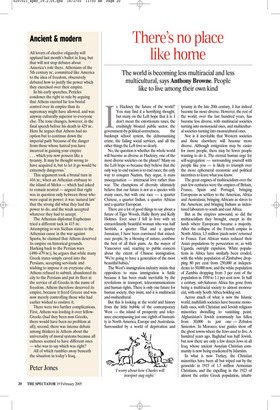Ancient & modern
All lovers of elective oligarchy will applaud last month’s ballot in Iraq, but that will not stop debates about America’s role there. Athenians of the 5th century BC, committed like America to the idea of freedom, obsessively debated how to justify the power which they exercised over their empire.
In his early speeches, Pericles condones the right to rule by arguing that Athens exerted far less brutal control over its empire than its supremacy might have allowed, and was anyway culturally superior to everyone else. The tone changes, however, in the final speech before his death in 429 BC. Here he argues that Athens had no option but to continue down the imperial path ‘because of the danger from those whose hatred you have incurred in gaining your empire ... which you now possess like a tyranny. It may be thought wrong to have acquired it, but to let it go would be extremely dangerous.’ This argument took a brutal turn in 416 BC, when an Athenian embassy to the island of Melos — which had asked to remain neutral — argued that right was in question only between those who were equal in power; it was ‘natural law’ that the strong did what they had the power to do, and the weak accepted whatever they had to accept.
The Athenian diplomat Euphemus tried a different tack in 415 BC. Attempting to win Sicilian states to the Athenian cause in the war against Sparta, he claimed that Athens deserved its empire on historical grounds. Harking back to the Persian wars (490–479 BC), he argues that while many Greek states simply caved into the Persians, accepting servitude and wishing to impose it on everyone else, Athens refused to submit, abandoned its city to the Persians and put its fleet at the service of all Greeks in the name of freedom. Athens therefore deserved its empire, because it freed Greece and was now merely controlling those who had earlier wished to enslave it.
There were two further complications. First, Athens was lording it over fellowGreeks (had they been non-Greeks, there would have been no problem at all); second, there was intense debate among thinkers in Athens about the universality of moral systems because all cultures seemed to have different ones — who was to say which was right?
All of which rumbles away beneath the situation in today’s Iraq.
Peter Jones

















































 Previous page
Previous page